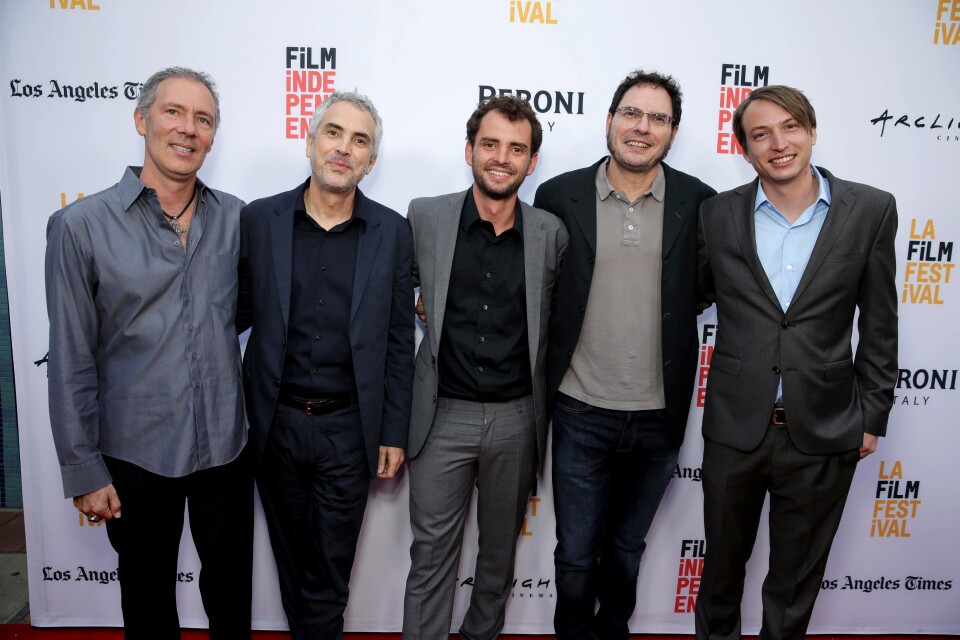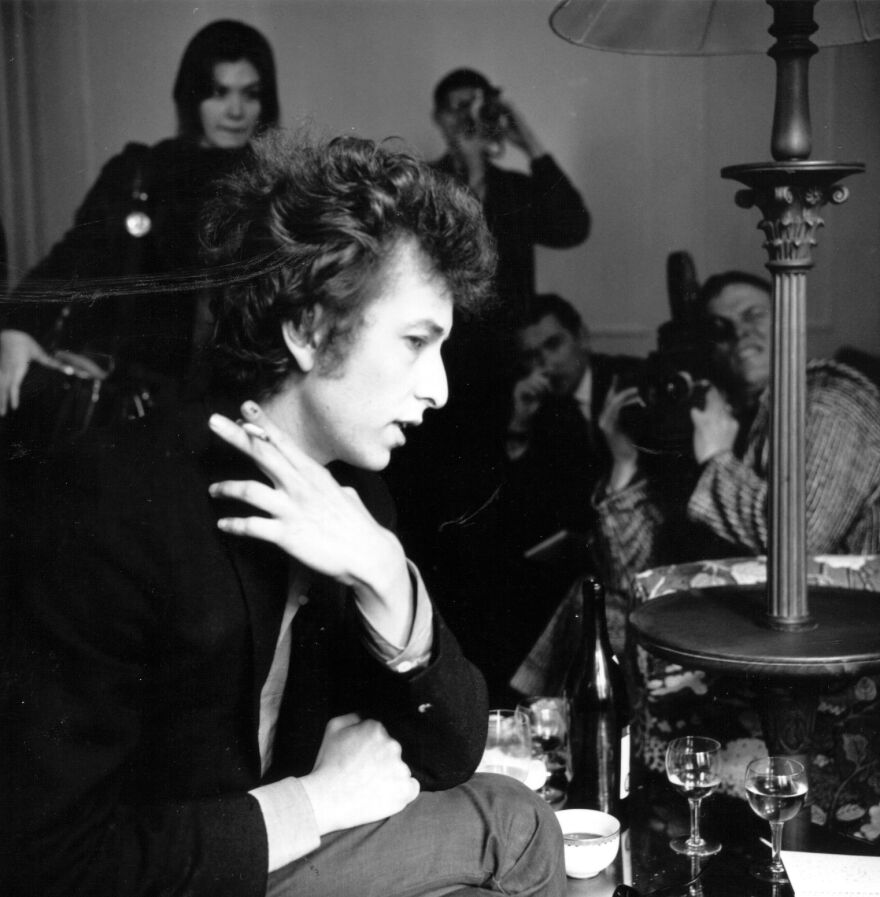The New Yorker editor David Remick on Bob Dylan's literary cred; Jonás Cuarón explains why he made a movie about immigration as an action-thriller; Amazon wants your music streaming business; "A Nation Engaged": "Fresh Off the Boat" creator Nahnatchka Khan; Neon Trees singer Tyler Green comes out and leaves the Mormon church.
'Desierto': Can Jonás Cuarón's action-thriller change the conversation about immigration?
The movie “Desierto” distills the issue of immigration along the US-Mexico into a spare action thriller. Directed and co-written by Jonás Cuarón, the film stars Gael García Bernal as one of a group of migrants trying to cross the border in a brutal desert while an American vigilante, played by Jeffrey Dean Morgan, tries to pick them off one by one with his hunting rifle.
You know the sad thing about this project is that when I started 10 years ago I wanted it to be a fable – a parable– of something far, far away of what could happen if this hatred keeps growing. But now that the movie's coming out, sadly, it doesn't seem like a far away fable.
It’s hard to watch “Desierto” and not think about the recent debate around immigration in this country. But it was a trip across Arizona a decade ago, when laws and rhetoric around migrants was at a fever pitch, that first gave him the idea.
When The Frame's John Horn sat down with Cuarón, they discussed what he learned about migrants through research and by shooting the film on the border. But they began with the revelation that it was an early low-budget Spielberg movie that helped him realize he needed to make his migrant tale into a thriller.
To hear the full interview, click the play button at the top of the page.
Interview Highlights
How Stephen Spielberg's 1971 movie "Duel" inspired the tone of "Desierto":
I was watching "Duel" by Spielberg, which is this amazing thriller where it's just so simple. It's a truck chasing a car throughout the whole movie. But, you know, even though there's no dialogue and the narrative is so simple the movie ends up talking about so many issues. You can see that truck as your bully at school or see him as your boss at work. So I felt it would be interesting to talk about the subject of immigration but talk about it through a genre because that way I could reach a wider audience and not, as they say, preach to the converted.
How Cuarón sees the motivations of the vigilante in the film:
Economical vulnerability...I do believe that economical vulnerability is one of the main cases people are angry. The U.S. is impressive– like it's one of the richest countries but also, as you travel through it, you also see regions that are filled with poverty. There's huge parts that are asking, why are they in that situation? On the other hand, we have politicians that are blaming migrants for that situation [and] in a country where there's lax gun controls.
The film opens inside a truck full of migrants crossing the U.S.-Mexico border where one woman is reading "The Migrants Prayer" out loud to herself in Spanish.
“The journey towards you, Lord, is life. To set off... is to die a little. To arrive is never to arrive until one is at rest with you. You, Lord, experienced migration. You brought it upon all men who know what it is to live who seek safe passage to the gates of heaven. You drove Abraham from his land, father of all believers. You shall remember the paths leading to you, the prophets and the apostles. You yourself became a migrant from heaven to earth.” — from ‘The Migrant’s Prayer’

Why Cuarón opened the film with "The Migrant's Prayer":
For two reasons. One, as I was doing research about the actual journey migrants go through that prayer is so important to them, you know? For migrants that prayer is a thing [that] they carry with them. And [it's in] all the shelters they go through while they're crossing Mexico because, it's important to note, that for Central Americans crossing Mexico it's probably more terrifying than for Mexicans crossing into the U.S. And that's also partly why I decided to call Gael's character Moses. It's because I really wanted to underline that notion that migration is not how we see it nowadays as a new problem. It's not a problem. It's a phenomenon. And it's a phenomenon that has existed since humanity existed. If it wasn't because of migration we would not have left Africa. We would not be here. Migration, like in the case of Moses, is part of our oldest narratives. So that's part of why I really wanted to start out the movie with that prayer.
What surprised Cuarón about the physical challenges of being in the desert on the border:
Honestly that people do that daily. We were in those conditions but we had shade, we had water, and still the conditions were really hard. And to think that people do that daily– and truly like going deeply nothing like what we did – to me seemed so heroic.
"Desierto" opens October 14th.
Tyler Glenn of Neon Trees goes it alone and gets personal
Singer Tyler Glenn is best known as the frontman for Neon Trees. The rock band has released three successful albums, which have spawned several singles that hit the Billboard charts.
Glenn is about to release his first solo album. It’s called “Excommunication” and it’s inspired by his recent departure from the Mormon Church due to his sexual orientation.
The Frame’s James Kim spoke with Glenn about sharing such a personal story.
Interview Highlights:
On tracing his personal identity through his records:
I only know what I know when I'm writing records. I look at Neon Trees records and am like, Okay, I was definitely 25 when I wrote "Habits." I was definitely 28 figuring out if I'm going to come out or not when I wrote "Picture Show." And then when I wrote "Pop Psychology," I was like, I need to come out, but I'm not ready to. But let me write all about my identity crisis on this record. With "Excommunication," it is under my own name. And since coming out as gay at 30, and now I'm 32, I'm figuring out what it's like to be a gay man [who's] not Mormon, and that's really exciting and different.
On reconciling his religion with his sexuality and music:
I did hide my sexuality in religion. I was taught it was a thing I could overcome. That was always a thing that I thought I needed to suppress or fix. And in that community I was sort of being a poster boy for making gay Mormon work. I would go out and do speaking events and make a space for LGBTQ people. But the line was drawn in the sand when the church repeatedly gut-punched its LGBTQ members, most recently with a policy that bans same-sex couples and their children, essentially. So it's been a weird year and I think that's all poured into this record. But at the same time, this record I think is for anyone [who's] ever felt marginalized.
Tyler Glenn’s new album is called “Excommunication" on Oct. 21.
'Fresh Off The Boat' producer Khan: As power shifts, things get ugly, but 'it makes me feel hopeful'
KPCC and other NPR Member stations are participating in a national conversation called "A Nation Engaged." This week at The Frame, we're asking creators who work in arts and entertainment to weigh in on our nation's state of affairs.
Nahnatchka Khan is the creator and executive producer of the ABC series, “Fresh Off the Boat." The daughter of Iranian immigrants, Khan is part of what she calls "the bridge generation” — the advance team that makes forays into America and reports back to the family.
Here are Nahnatchka Khan's responses for "A Nation Engaged":
What does it mean to be an American?
I don't look for people to be exclusionary and close down a country that is built on immigrants. It's just not anything that reflects any experience of myself or people I know or, frankly, the direction I want the country to go in. So I don't take that as, Oh my gosh, the majority is feeling a way that I don't! I take that as, This minority is raging against the machine and raging against the dying of the lights! And [the ruling class is] reacting so loudly because they're used to being in power for so long. And when the power balance starts to shift, this is a reaction that you get from what I think will become the minority, if not already. It makes me feel, instead of the initial expected reaction of being afraid, it makes me feel hopeful.
What could the next president do to advance your vision?
What I would love is for my president to embrace the idea that the country and the populace are so well-versed in politics at this point that we understand when you're being political and when you're being a politician. Politicians have to acknowledge that it's a different game now and you would gain so much more by being honest. For so many instances, the cover-up is worse than the actual transgression. Just be honest. No one is perfect. And if you expect your politicians to be perfect, you're going to be disappointed ten out of ten times.
Series: A Nation Engaged
NPR and KPCC's coverage of critical issues facing the nation before November's presidential election. The stories seek to build a nationwide conversation around focusing on a specific question each time.
Read more in this series and let us know your thoughts in the comments section below or on Facebook.




